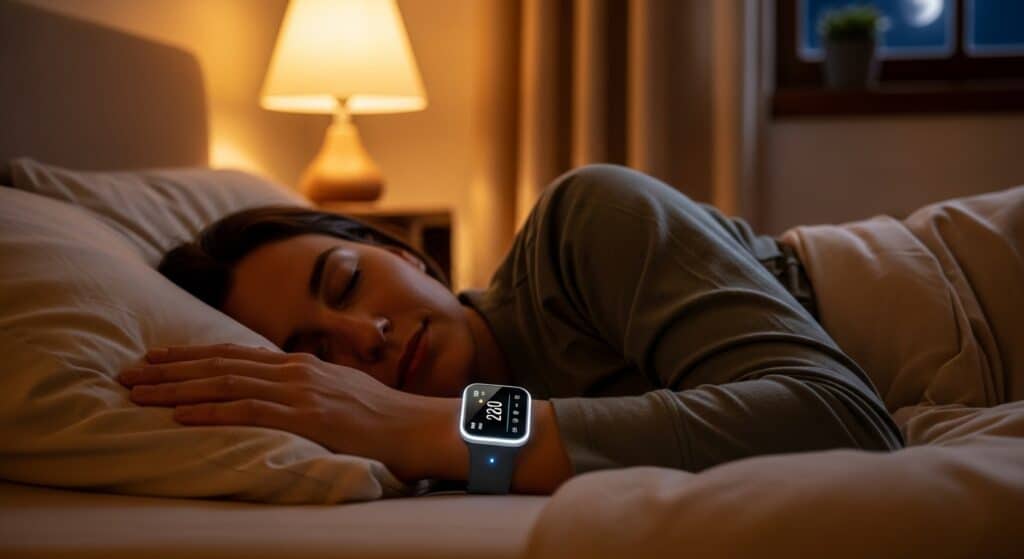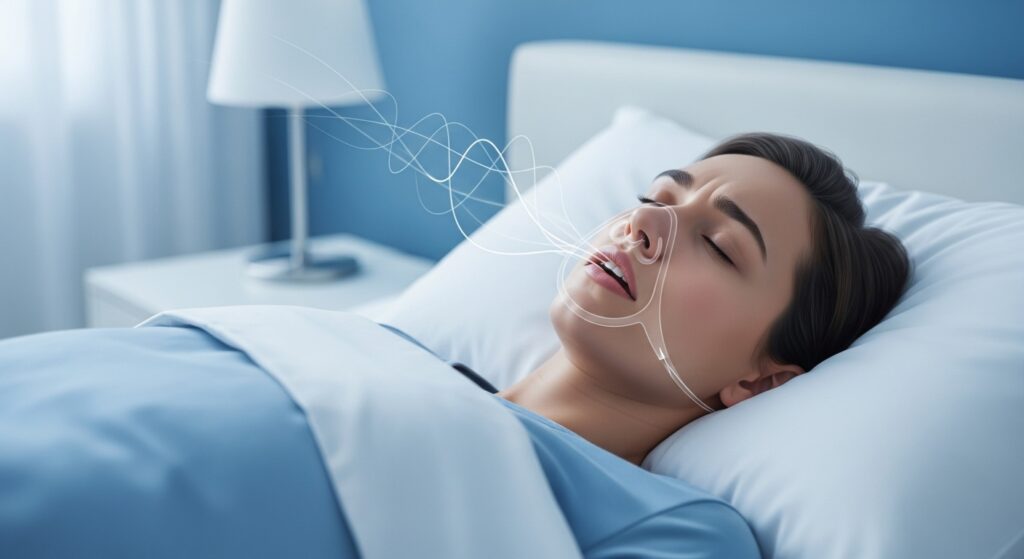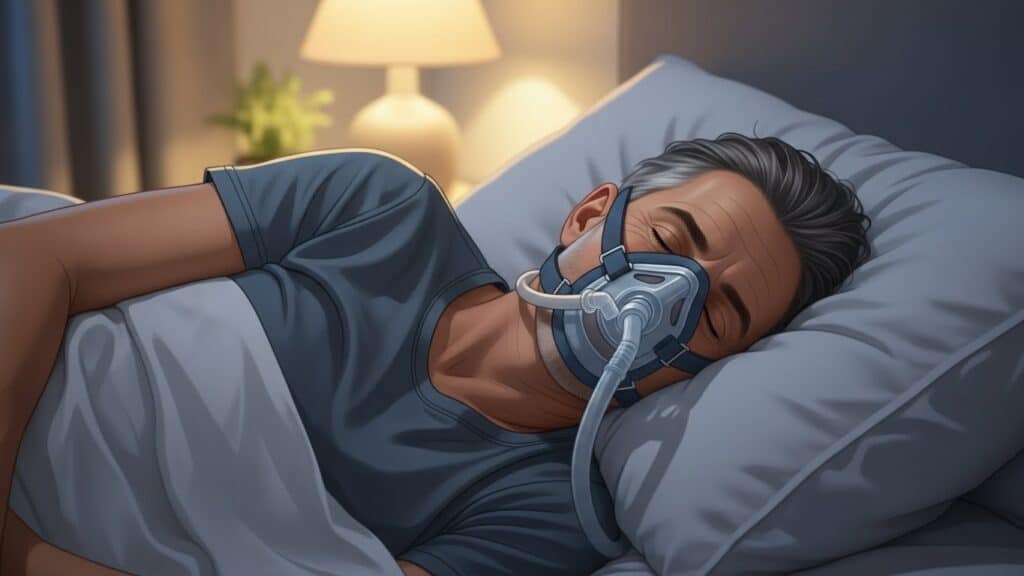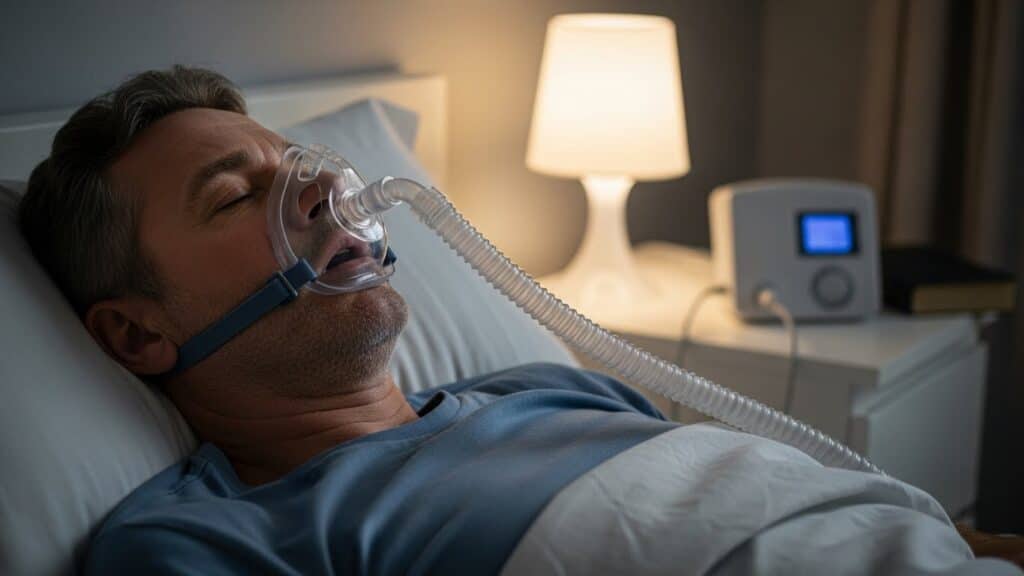Have you ever woken up tired even after a full night in bed? For many people, that tired feeling has a hidden cause—sleep apnea.
Experts estimate that nearly 1 billion adults around the world may have this condition, and many don’t know it yet.
This common sleep problem quietly interrupts your breathing while you rest, making your nights less restful and your days harder to face. Over time, poor sleep can affect how you think, feel, and react to stress.
Your brain needs steady rest and oxygen to stay balanced. When sleep keeps getting cut off, your body feels it, and so does your mind. Many people who struggle with mood changes, sadness, or worry may not realize that their sleep plays a big part.
This post goes over how the body and mind are connected through sleep and why understanding this link can change how you feel each day.
What Is Sleep Apnea and Why Does It Matter?
Sleep apnea is a condition that causes a person to stop breathing for short times while sleeping. These pauses can happen dozens or even hundreds of times each night. The most common type, obstructive sleep apnea, happens when the airway becomes blocked.
Here’s what often happens:
- The throat muscles relax too much.
- Breathing gets shallow or stops.
- The brain wakes the body up just enough to start breathing again.
- You fall back asleep without realizing it happened.
That pattern repeats over and over. Even though you may not remember waking up, your body does. The result is broken, low-quality sleep.
Why it matters
Good sleep helps your body repair itself, manage stress, and think clearly. When sleep is interrupted, your body misses out on deep rest. Over time, you may notice:
- Constant tiredness
- Trouble focusing
- Irritability
- Forgetfulness
- Morning headaches
A home sleep apnea test can help find out if you have this condition. It’s a simple test that tracks your breathing, oxygen levels, and heart rate while you sleep in your own bed.
If left untreated, sleep apnea can lead to bigger health problems, like high blood pressure, heart disease, or memory loss. It can also affect your mood. Many people notice emotional changes long before they realize their sleep is to blame.
How Poor Sleep Affects the Brain and Emotions
Your brain depends on good rest to stay healthy. When you sleep deeply, your brain clears waste, stores memories, and resets emotional balance. When sleep is poor, the brain never gets that full reset. That’s where problems begin.
Sleep apnea can cause chronic sleep deprivation effects, which means your body and brain stay tired for days or weeks. Without enough deep sleep:
- The brain has trouble controlling emotions.
- Small problems feel bigger.
- Focus and memory get weaker.
- Stress hormones rise, making you feel tense.
The body also releases more cortisol, a stress hormone that keeps you on edge. High cortisol levels make it hard to relax or think clearly. Over time, this can lead to irritability, mood swings, and even sadness.
Poor sleep also changes how the heart and nervous system work. One important sign is night time heart rate variability. This measures how your heartbeat changes while you rest. Low variability often means your body is stressed and not recovering well during sleep. People with sleep apnea often show this pattern because their breathing keeps the body in “alert” mode all night.
Even your immune system feels the strain. A tired body becomes more sensitive to pain, sickness, and stress. The mix of physical and emotional exhaustion makes it harder to stay positive or calm.
That’s why experts study the connection between insomnia and mental health. They know that poor sleep isn’t simply uncomfortable—it can slowly wear down your emotional strength. The good news? When sleep improves, mood and focus often do too.
Could Sleep Apnea Be Behind Your Sad or Anxious Feelings?
Many people with sleep apnea and depression describe feeling drained, sad, or unmotivated. Others deal with constant worry or restlessness. These symptoms are common in mood disorders, but they can also come from poor sleep.
When you stop breathing during the night, oxygen drops. The brain senses danger and wakes you up just enough to start breathing again. That constant cycle keeps your mind in a state of stress. Over time, the brain starts linking bedtime with anxiety, creating a pattern of sleep and anxiety that’s hard to break.
Here’s what can happen:
- You wake up several times without realizing it.
- The brain becomes less sensitive to “happy” chemicals like serotonin.
- You feel down, forgetful, or easily upset.
- Anxiety grows because your body stays on high alert.
Researchers have also found a strong link between anxiety and poor sleep. When you don’t rest, the body’s fight-or-flight system stays active, even during the day. That’s why you may feel jumpy, nervous, or emotional without knowing why.
If you often feel sad or anxious and wake up tired, it’s worth asking your doctor about a sleep study. Getting tested and treated can lead to brighter moods, calmer days, and sharper focus. For many people, improving sleep has been a turning point in their mental health.
How Sleep Apnea Affects Mental Health
Sleep apnea doesn’t only disturb your sleep—it can also change how your brain and emotions work. When your breathing stops and starts during the night, your brain reacts like it’s in danger. It wakes you up slightly to make you breathe again. This can happen dozens or even hundreds of times a night. You might not remember waking up, but your body feels it every time.
Over days and months, this pattern wears down your mental strength. It can make you feel tired, foggy, and emotionally flat.
Here’s how this happens and what you can do to feel better.
1. How Interrupted Sleep Changes the Brain
Your brain needs deep, steady sleep to recharge. During this time, it organizes memories, balances hormones, and refreshes your mood. When sleep keeps breaking up, those steps get skipped.
This lack of full rest affects brain regions that manage emotion and focus—especially the prefrontal cortex and amygdala. The amygdala is the part of the brain that helps you react to fear and stress. When you lose sleep, it becomes overly active. At the same time, the prefrontal cortex, which helps you stay calm and make smart choices, slows down.
That’s why you might notice changes like:
- Feeling more irritable or emotional
- Having trouble making decisions
- Overreacting to small problems
- Forgetting things you normally remember easily
Over time, these brain changes can lead to chronic sleep deprivation effects, which means your mind and body both start to slow down. Your mood drops, your focus fades, and even your sense of motivation can shrink.
2. The Emotional Toll: Sadness, Worry, and Low Energy
Many people with sleep apnea report feeling sad or anxious. The link between sleep apnea and depression is strong, and research shows that treating sleep apnea often improves mood.
Here’s why it happens:
- Oxygen dips during sleep change how the brain processes chemicals like serotonin and dopamine, which control mood.
- Interrupted sleep makes it harder for the body to handle stress.
- Constant tiredness makes daily life feel heavier and more frustrating.
This mix of physical stress and emotional strain can slowly lead to depression-like symptoms. You may start feeling less interest in activities, lose energy, or feel hopeless for no clear reason.
The good news? When sleep improves, mood often follows. Many people notice they feel more upbeat, more focused, and more patient once their sleep apnea is treated.
3. Anxiety and Restless Nights
Sleep apnea and anxiety often feed off each other. Poor breathing during the night can make your body stay alert, even when you’re supposed to be resting. This can lead to sleep and anxiety problems that make both conditions worse.
When the brain wakes up multiple times during the night, your body releases stress hormones like cortisol and adrenaline. These hormones tell your body to “stay ready,” as if danger is near. This constant alertness can make you feel jumpy, nervous, or uneasy during the day.
Many people describe waking up with a racing heart or feeling panicked for no reason. These feelings can make it harder to fall back asleep, creating a cycle of anxiety and poor sleep. Over time, this can affect relationships, work, and even physical health.
Therapists sometimes recommend cognitive behavioral solutions to reset sleep, which help retrain your brain and body to relax at night. These methods teach new habits for calming the mind, setting a steady sleep schedule, and reducing nighttime stress. They can work very well alongside medical treatments for sleep apnea.
4. The Role of Stress Hormones and the Body’s Clock
Your body runs on a 24-hour rhythm, called the circadian rhythm. It tells you when to feel awake and when to rest. Sleep apnea can confuse this rhythm. When your breathing keeps stopping, the body releases stress hormones that keep you alert. This raises your nighttime heart rate and makes deep sleep hard to reach.
When stress hormones stay high for too long, your mood and focus drop. You might feel moody or have a hard time managing emotions. Your energy swings up and down, and small challenges can feel overwhelming.
These stress patterns can also affect blood pressure, weight, and even digestion. The brain and body are tightly linked, so when one struggles, the other does too.
5. How Tiredness Changes Thinking and Memory
People with sleep apnea often describe “brain fog.” That means it’s hard to think clearly, remember things, or focus for long. This happens because the brain doesn’t get enough oxygen or deep sleep to repair itself.
When you miss that nightly reset, your brain has to work harder to do normal tasks. It’s like trying to run a computer that never restarts—it gets slower over time. You might notice:
- Trouble focusing on conversations
- Forgetting where you put things
- Needing more time to complete simple tasks
- Difficulty following directions or multitasking
Untreated sleep apnea can also raise the risk for long-term memory problems. That’s why early diagnosis matters. A home sleep apnea test is an easy first step. It measures your breathing, oxygen levels, and movement while you sleep. Your doctor can then decide if you need treatment like a CPAP machine or another solution.
6. How Treatment Improves Mental Health
The encouraging news is that treating sleep apnea can bring noticeable changes to mental health. Once breathing improves and sleep becomes more consistent, the body starts to heal itself.
Benefits may include:
- Better mood and motivation
- Sharper focus and memory
- Fewer feelings of sadness or worry
- More energy during the day
- Greater patience and emotional balance
Treatment options vary depending on your condition. Many people use a CPAP machine, which keeps the airway open by gently pushing air through a mask. Others may use dental devices, lifestyle changes, or surgery if needed.
Some people also combine medical treatment with counseling or stress management strategies. For example, relaxation training and therapy for insomnia and mental health can help reduce nighttime awakenings and calm racing thoughts.
Building healthy habits like regular exercise, consistent bedtimes, and reducing caffeine also support better sleep and mental balance.
7. The Bigger Picture: Why Mental Health and Sleep Go Together
Sleep and mental health are deeply connected. You can’t have one without supporting the other. When your sleep is broken, your emotions and energy suffer. When your mood is low or anxious, it becomes harder to sleep well.
This two-way connection shows why taking care of your sleep is one of the best things you can do for your mind. It’s not about perfection—it’s about progress. Even small improvements, like using your CPAP every night or sticking to a bedtime routine, can make a big difference.
Here’s what you can do to start improving today:
- Talk to a doctor if you snore or wake up tired often.
- Ask about a sleep study or home test if you think you might have sleep apnea.
- Create a calm bedtime routine. Turn off screens, dim lights, and relax before bed.
- Stay consistent. Go to bed and wake up around the same time every day.
- Work on stress. Gentle exercise, breathing exercises, or talking to a therapist can help.
Your mental health matters. By paying attention to your sleep, you’re giving your brain and body the reset they need to work their best.
Sleep apnea may seem silent, but its impact can be loud in your life. The good news is that with the right help and habits, you can quiet the noise, rest deeply, and wake up feeling like yourself again.
Conclusion
Sleep apnea doesn’t only affect your nights—it can shape how you feel, think, and live each day. Understanding this connection helps you take control of your well-being. If you’ve been feeling low, anxious, or constantly tired, it might be time to look at your sleep. Talk with a healthcare provider, consider a simple sleep test, and take steps toward a healthier mind and body.
Better rest can change everything. For more information or support, visit Sleep Apnea to learn how better sleep can help you feel like yourself again.
Frequently Asked Questions
How can I tell if I might have sleep apnea?
Loud snoring, gasping during sleep, morning headaches, and feeling tired even after a full night’s rest are common warning signs.
Can children have sleep apnea too?
Yes. Kids can have sleep apnea, especially if they have enlarged tonsils or struggle with weight. Symptoms often include restless sleep or trouble paying attention.
Does treating sleep apnea help with depression or anxiety?
Many people feel better after treatment. Good sleep can lift mood, ease stress, and improve focus.
Is a home sleep apnea test accurate?
Yes. It tracks breathing, oxygen, and heart rate at home and can help doctors confirm a diagnosis quickly.
Can weight loss help sleep apnea?
Yes. Losing weight can reduce airway blockage and improve breathing, but it’s best to work with a doctor to find the right plan.





